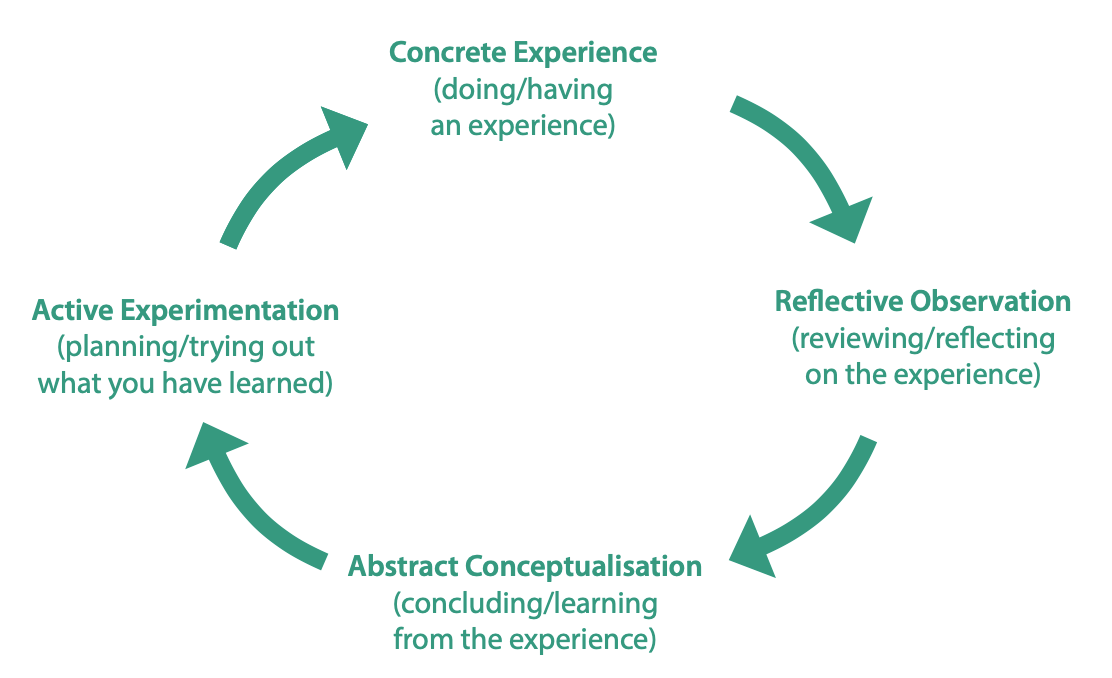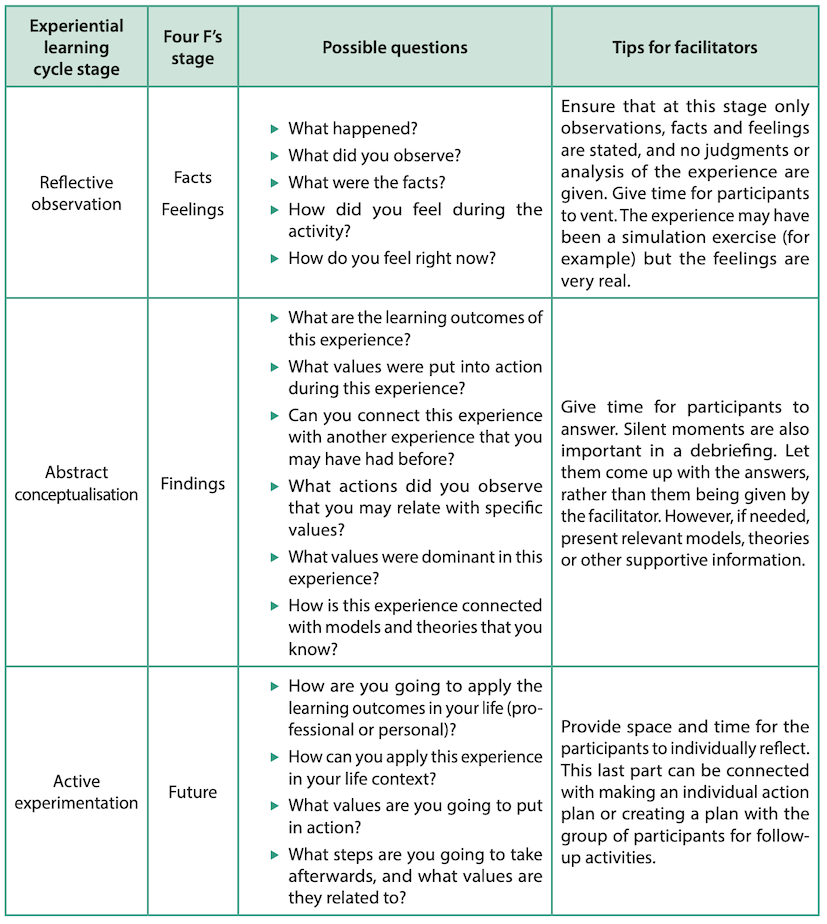1
Experiential Learning and Debriefing
Experiential Learning and Debriefing
Sobre
The experiential learning cycle is a critical element in non-formal education and youth work contexts. It integrates the learning process in different ways and areas.

Image source: T-Kit 14 – Value-based learning in mobility projects, Page 128
To understand it more thoroughly, watch the video, which focuses on essentials of the experiential learning and ways to structure the debriefing of the experience.
Disclaimer: Be mindful that this video was created having in mind trainers and facilitating learning in the training context. However, many principles will apply to designing and debriefing learning experiences in a youth work context.
After an experience with a group of participants, the debriefing is a key element following the experiential learning cycle. A debriefing is a guided reflection with the participant(s) undertaken by the facilitator to support reflection and integration of any experience as a learning outcome.
DEBRIEFING
Objectives for debriefing
- To share the experience to decrease the frustration; to express verbally some of the emotions and feelings that participants have had; to identify feelings;
- To reflect upon the activity; to allow time for personal/group reflections; to share opinions;
- To enable participants to discover themselves; to air different points of view;
- To conceptualise what has happened; to bring the ideas down from the “air” to the “ground”;
- To introduce new elements; to see the interrelation; to answer the questions; to create new ones with a new dimension; to gain new knowledge; to find ways to transfer the knowledge to real-life situations; to share different perceptions and approaches.
To see how to apply the learning; to develop empathy and flexibility; to describe the objectives of the activity; to help participants become aware of the aim of the exercise; to check if the aim has been met; to evaluate the process; to analyse how the learning process is going; to try to show the objective of the activity.
Debriefings are activities that may support three out of the four stages of experiential learning. Dr Roger Greenaway, an expert on training teachers and facilitators, developed a method that can be used in debriefings and is easy to connect with the experiential learning cycle. His model or framework is called the four F’s,196 and consists of the following:
- Facts: an objective account of what happened. What were the situations and events of the experience?
- Feelings: the emotional reactions to the situation. What did the participants feel during the experience and how do they feel after it?
- Findings: the concrete learning that you can take away from the situation. What were the highlights and conclusions from the experience?
- Future: structuring your learning so that you can use it in the future. Reflect and plan on how to use this learning experience in the wider life context.
Having this framework as an example, while not minimising other debriefing frameworks and models, can support understanding how to facilitate a debriefing to tackle the three stages of the experiential learning cycle.

Image source: T-Kit 14 – Value-based learning in mobility projects, Page 129
Many educational materials provide a facilitator with a set of debriefing questions for each activity. Bear in mind that debriefing is always a flexible process, depending on the group, their feelings, interventions and experiences.
This can be a tough and unpredictable task for the facilitator; hence, it is important to prepare debriefings very well, and yet still be flexible. Make sure that as a facilitator you always have sets of extra questions prepared and can handle emotional participants, conflicts of opinions, and so forth.
To be on the safe side, it is a good idea to always have a second facilitator colleague present (who has also witnessed the activity and the entire process), as a sort of backup (to throw in additional useful questions and suggestions on how to proceed), if needed.
And if by any chance as a facilitator, you get lost in the many pathways of debriefing, it can help just to check in your head “Where am I now in the series of WHATs?”
- What? (happened? did we experience?)
- So what? (why is that important?)
- Now what (what are we going to do with it?)
A major part of non-formal education, learning and sharing derives from good and well-led debriefings. So make them your priority or special discipline and keep on preparing, as well as improving them!
We selected several ideas for methods for debriefing. You can find ideas on how to run debriefing sessions by using various sizes of groups. Follow the link and explore how to organise solo reflection, reflection in pairs and larger groups: https://global.cityoflearning.eu/en/activities/7290
Sources of the activity content:
- T-kit no. 6. Training Essentials
- T-kit no 14, Value-based learning in mobility projects
- http://reviewing.co.uk/_site.htm
Go to the badge and submit evidence to showcase your learning and understanding of how to facilitate group dynamics.
The Awero organisation first created this educational resource and activity for the youth workers' training on Facilitating Learning course.
Activity content and badge issuing criteria aligned with the European Training Strategy (ETS) competence model for youth workers to work internationally:
- Being open towards learning/unexpected learning (for oneself and others);
- Readiness to include a space for emotions in all situations, including online environments;
- Knowledge of the principles of methodologies used in the field of youth;
- Skill of initiating and supporting self-reflection on learning;
- Skill of empathising in a way that others can learn from one’s experience;
- Acknowledges the experiences of others;
Want to endorse (?) our organisation, this activity and/or badge - email us! Contact us at info@awero.org for further questions.
Obter uma medalha da atividade
Debriefing Pro Obter esta medalha
This badge shows knowledge and understanding of the essentials of experiential learning, debriefing goals, structure and methods. The owner of this badge could watch videos, and read methods and theories linked to experiential learning and debriefing.
Badge owner had to provide personal reflection about one’s skills in facilitating debriefing with groups in the training setting.
Activity content and badge issuing criteria are aligned with the European Training Strategy (ETS) competence model for youth workers to work internationally.
Learning duration: 1,5 hour
Tarefas
Tarefa n.º 1
Evidência verificada por: um organizador de atividades
To get this badge, please share your reflection about your skills in facilitating debriefing with groups in the training setting:
- What are your strengths in designing and facilitating debriefing?
- What skill do you need to develop? What are your dilemmas related to facilitating debriefings?
Competências
#Being open towards learning/unexpected learning (for oneself and others)
#Readiness to include a space for emotions in all situations, including online environments
#Knowledge of the principles of methodologies used in the field of youth
#Skill of initiating and supporting self-reflection on learning
#Skill of empathising in a way that others can learn from one’s experience
Organizadores
Awero
Badge issuer recognized with
A Badgecraft é a anfitriã desta plataforma e desenvolve-a em conjunto com as principais organizações educativas. O programa Erasmus+ da União Europeia concedeu um cofinanciamento para a construção da primeira versão desta plataforma. Contacto: support@badgecraft.eu.
Plataforma
Alterar idioma:

